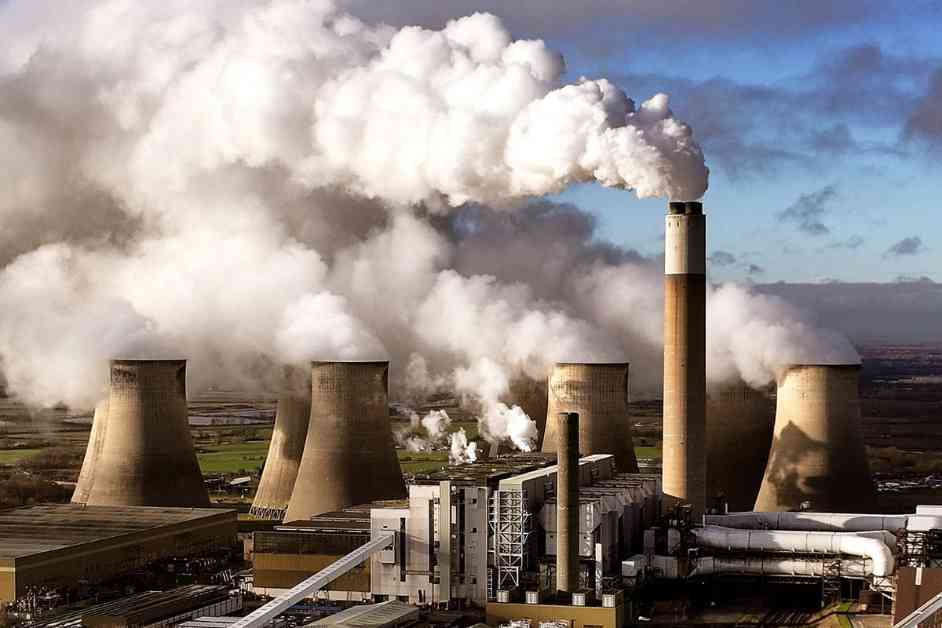The UK marked a historic moment on Monday as the last coal-fired power station in the country, Ratcliffe-on-Soar, shut down. This closure signifies the end of Britain’s 142-year reliance on coal to generate electricity, paving the way for a transition to cleaner energy sources. Ratcliffe-on-Soar, which has been in operation since 1968, has been a prominent fixture in the East Midlands skyline with its four coal-fired boilers, eight large cooling towers, and a towering chimney reaching 199 meters in height. This power station has been able to supply electricity to approximately two million homes and has been the final coal-fired facility in the UK since September 2023 when Northern Ireland’s Kilroot power station ceased coal production.
### Transition to Clean Energy
The closure of Ratcliffe-on-Soar comes as a result of the UK’s commitment to decarbonization targets and the increasing viability and affordability of renewable energy sources. Over the years, the country has witnessed a significant shift in its energy landscape, with coal’s share in the power mix dropping from 80% in 1990 to just 1% in 2023. This transition has been driven by a combination of factors, including government policies, technological advancements, and public awareness of the environmental impact of fossil fuels.
### Success Story in Energy Transition
Jess Ralston, head of Energy at the Energy and Climate Intelligence Unit (ECIU), described the UK’s shift away from coal as a success story that has been supported by governments of various political ideologies. Despite initial concerns about potential blackouts with the decline of coal-fired power stations, the UK has managed to maintain a stable electricity supply through a combination of renewable energy sources and natural gas. This transition has not only reduced carbon emissions but has also demonstrated the feasibility of a cleaner and more sustainable energy system.
### Impact on Energy Supply
The closure of Ratcliffe-on-Soar marks the end of an era for coal-fired electricity generation in the UK. The country’s journey from being heavily reliant on coal to embracing renewable energy sources like wind and solar power has been remarkable. Today, renewables account for more than 50% of the UK’s electricity supply, surpassing coal and gas in the energy mix. This shift towards cleaner energy has not only reduced greenhouse gas emissions but has also diversified the country’s energy sources, ensuring a more resilient and sustainable power grid.
The transition away from coal is a significant milestone for the UK, positioning it as a leader in the global effort to combat climate change and reduce reliance on fossil fuels. While countries like Sweden and Belgium have already phased out coal entirely, the UK’s achievement in shutting down its last coal-fired power station sets a precedent for other nations to follow suit. By prioritizing renewable energy investments and setting ambitious targets for carbon neutrality, the UK is setting an example for the rest of the world to emulate in the transition to a sustainable energy future.
### Future of Energy Transition
As the UK continues its journey towards a net-zero emissions target by 2030, the focus is now shifting towards further reducing the use of natural gas and accelerating the deployment of renewable energy technologies. The government’s commitment to supporting green energy projects, such as offshore wind farms and solar installations, is a step in the right direction towards achieving a cleaner and more sustainable energy system. By investing in new technologies like carbon capture and storage, the UK aims to create a robust energy infrastructure that is resilient to global market fluctuations and environmental challenges.
The closure of Ratcliffe-on-Soar power station symbolizes the end of an era for coal-fired electricity generation in the UK. This landmark moment not only marks a significant step towards achieving carbon neutrality but also highlights the country’s commitment to embracing clean and renewable energy sources. As the world looks towards a more sustainable future, the UK’s transition away from coal serves as a shining example of how bold policy decisions and technological innovation can drive positive change in the energy sector.












